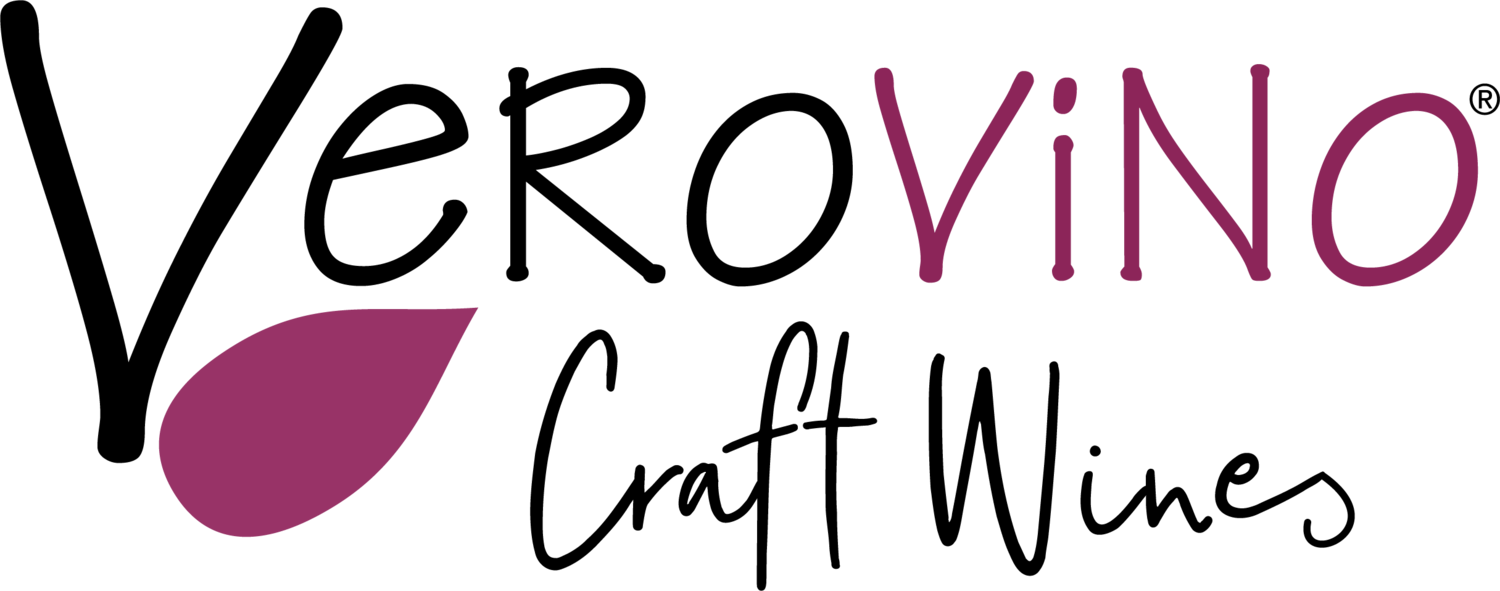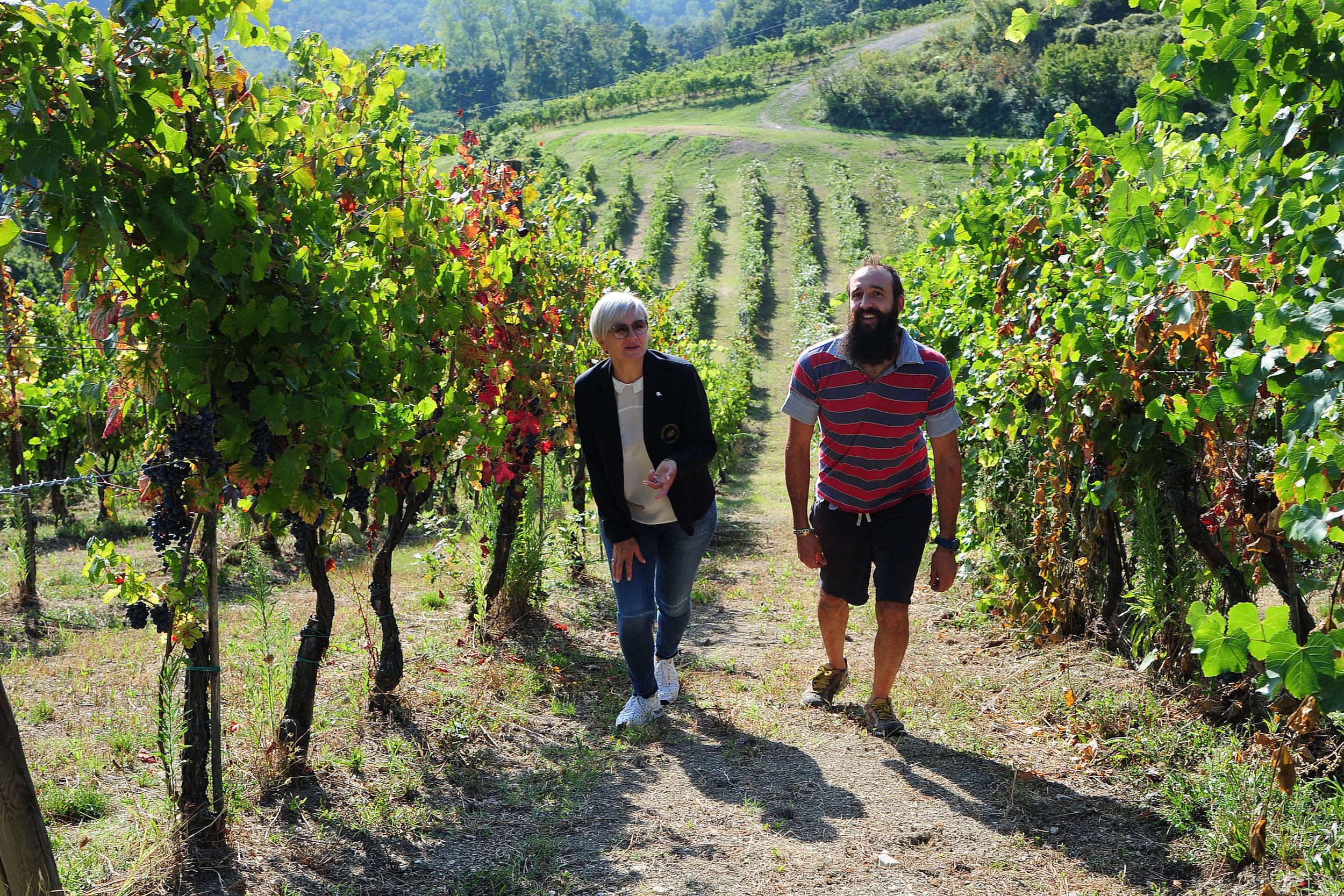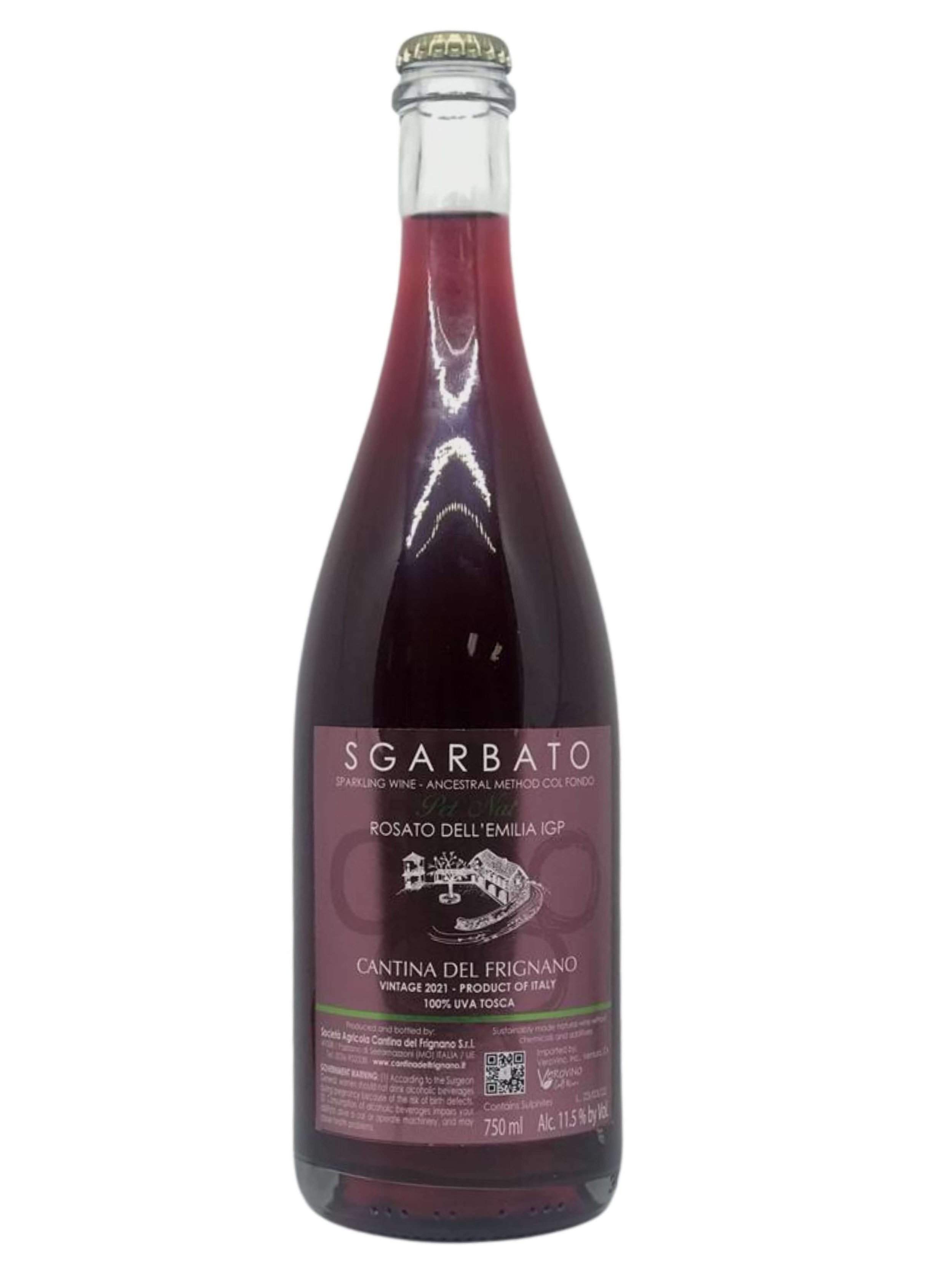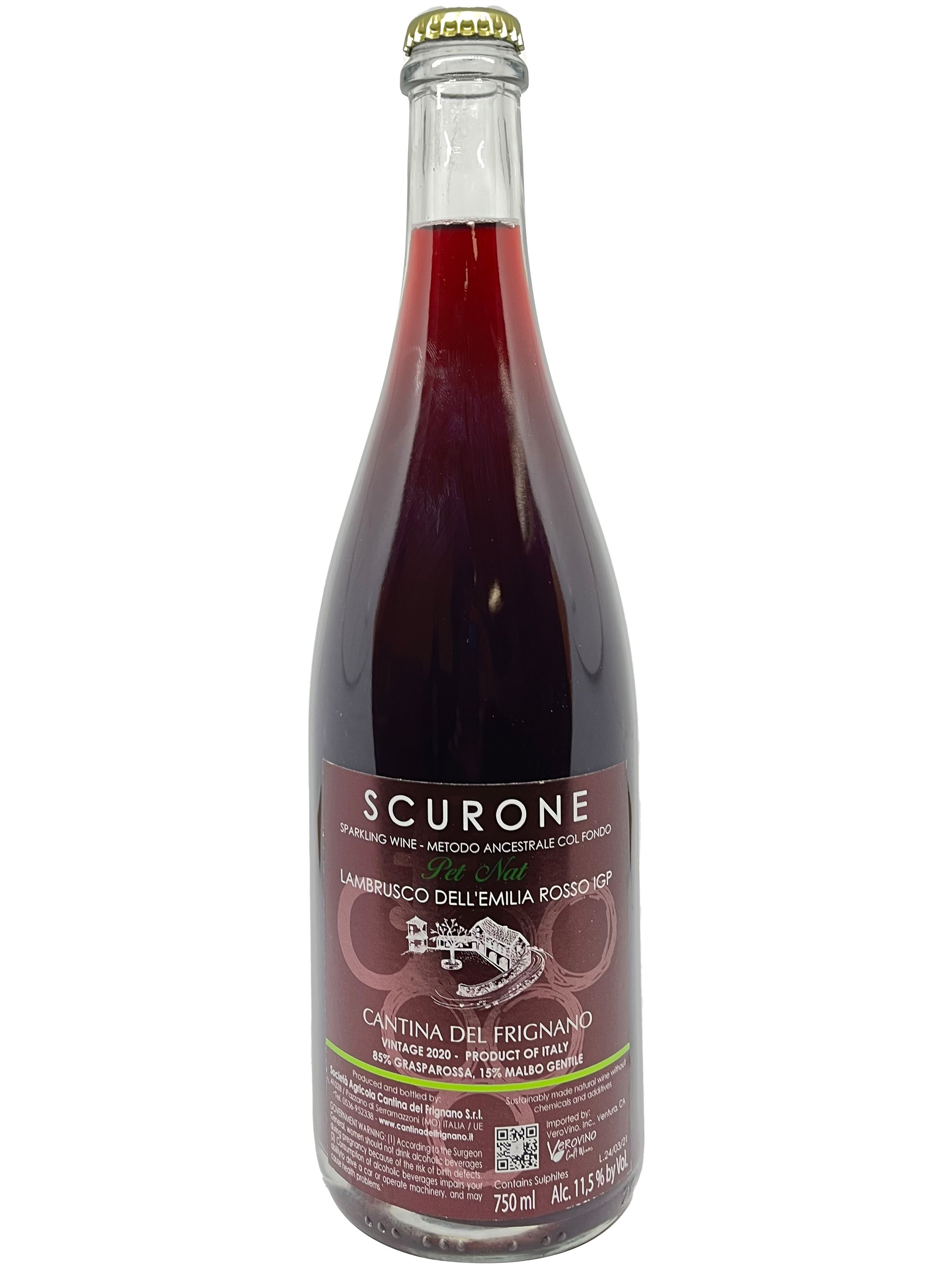Ukrainian Woman Takes on Native Varieties & Pet Nats at Modena Winery
In the heart of Lambrusco country, there is a winery that strays from the pack of making the same old lambrusco red wine. That would be Frignano, a woman owned winery that is organic, sustainable, focused on hyper-local indigenous grapes, and they make pet nat style sparkling wines with native yeast fermentation. So they pretty much the opposite of a traditional, mass market lambrusco, and Frignano check all the boxes for natural wine.
But who is the driving force behind this phenomenom? That would be woman in wine, Irene Balim, and her story is fascinating. Originally from the Ukraine, she is living the bella vita dream we all have: living in the Italian countryside and making delicious wine. It wasn’t a straightforward road (as many expats can attest, moving your life abroud never is as you expect it), and her path led her up hills and through many twists, and turns.
With a story like this, it is best to hear it directly from the source… so let’s learn Irene’s journey through her own words in her exclusive interview with Vero.
Irene Balim walks with Matteo who helps her look after her vineyards at Frignano estate near Modena, Italy.
All About Irene Balim
Tell us a little bit about yourself, Irene. Where are you from originally, and what was your childhood like?
I was born in Zolochiv in the province of Lviv in western Ukraine. Both of my parents were farmers, and I grew up with my grandparents in the countryside. I would help my grandparents care for all the animals (pigs, cows, hens, and rabbits) along with several cats and a dog named Tusik. Already as a young girl I would see my grandfather make ‘wine’ with honey (like a cider), with viburnum berries mixed with ‘uva fragolina’ (sweet grapes similar in taste to concord grapes), and I remember well the big bottles when they would be bubbling and fermenting. One of my most treasured memories is when, at the beginning of spring, all the trees and bushes would be covered in agricultural lime (a natural soil improver). I would even sometimes even help apply it, using a painter’s brush. My grandfather never used chemicals nor other harmful substances when working in the garden, orchard, or vineyard; perhaps this is where my passion for organic farming got started.
What did you study and do for work before coming to own a winery?
Before I owned a winery, I finished my high school in Zolochiv. Then I studied in Lviv to get my degree in the business of food products.
Irene and Frignano can be found near to Modena and Bologna, Italy in the region of Emilia Romagna.
How did you find yourself in Italy? What is your area like?
After I graduated, I opened a shop in Zolochiv for a few years, but when when the economic crisis of 1998 hit the Ukraine, I decided to see what Italy had to offer. I thought to live abroad for only a year or two… but instead I am still here in Italy!
I ended up in Italy in the province of Modena (heartland of the famous balsamic vinegar), and in the beginning I lived in a town called Vignola, which is very famous for its cherries. Eventually I moved more into the Modena Apennines mountain range where I live now in the hilly area. I am at 500 meters above sea level (an altitude of just over 1600 feet) and am surrounded by forests of oak and chestnut trees. I have a big garden with roses, fruit trees, and even olive trees (which I still love to pain white with lime like when I was a child). I also have a chicken coop with 13 hens (each with their own special personality and name), two cats, and five dogs.
I have lived in Italy for 25 years now, in this naturalistic paradise. True, I have ‘Italianized’ myself, and I am very happy here. I feel like I did as a little girl… happy! All told though, I remember my roots proudly, and will always be, at heart, Ukrainian.
The Winery
How did you fall in love with wine? What about it inspired you to start learning and working in the wine world?
I have always loved wine; something stuck with me when, as a little girl, my grandfather told me ‘to make good wine you don’t need much: a hoe, some land, passion, and the desire to get your hands dirty’. However, I was truly pushed to learn more and seriously study wine after one event: a dinner.
It was at a Michelin starred restaurant in Modena called ‘Strada Facendo’, and my companion and I had picked a special bottle of wine. The bottle was opened and presented by the sommelier, Signora Rita, and she amazed me. She was able to talk for 10 minutes recounting the wine in such an amazing way… when I could barely recognize at that time that it was a still red wine! After that I decided to take the AIS (Association of Italian Sommeliers) courses, and after completing all three levels, officially became a sommelier in 2018. I also continued on to the Master AIS program with the international culinary school ALMA in Colorno, Italy, blending the studies of food and wine. At the time, however, all of this studying I started just for fun and to satisfy my own personal passions; when I started these programs I had no idea that in my wildest dreams I would end up owning a winery and becoming a wine producer!
The beautiful grounds of Frignano mountain winery.
How did you come to own a winery?
This journey began when we learned that our favorite winery, was going out of business. We always bought their wine for private parties, and also for building gift baskets at Christmas time for friends, family, and customers.
The winery was just a few miles from our house, and was called Villa Boni. They made really good wines in our area, we’re certified organic, and basically we just loved them. It was actually my companion that encouraged me to make an offer and buy the winery.
It was with this huge leap that I went from an employee in a local car dealership to a winemaker… after all farmer I had already been in my childhood.
What has been your experience, as not only a woman, but a foreigner as well, trying to enter into the world of wine? Did you find any push-back, and how have you fought it?
Even though I was prepared, it hasn’t been too easy; I am blonde with green eyes, obviously foreign, and sometimes it takes some extra hard work to convince certain people. But, I believe, the best way to conquer those doubters is to show them what you bring to the table when you showcase your final product.
Even still I find people that are dubious of a foreign-woman winemaker in Italy… but don’t worry! It only takes a sip of my wine after my presentation of the beauty of this area to assuage their doubts! I hope I am able to communicate my pride, passion, and love for this land and the indigenous grapes I work with, Uva Tosca and Malbo Gentile.
Popping the Cork on Her Wines
Why did you decide to make organic wines with native yeast fermentation in the ancestral (pet nat) method? Do you consider your wines ‘biodynamic’?
Irene proudly showing off here hyper local, Malbo Genile grape in one of the high altitude Frignano vineyards.
Wines re-fermented in the bottle on the lees, such as with pet nat/ancestral method or the classic champagne method, were already produced by the previous owner, Luigi Boni. As well, converting the winery to organic had been his work. I carry on in his honor these initiatives.
I also work with a consultant that has been teaching me how to continue down this path and we are working on transforming our winery into a biodynamic haven. I am very interested in this idea; I love the idea to go back to basics and even have horses working the land again like my grandfather Jose used to.
Let’s talk about the hyper-local grape varieties you use. Why have you decided to focus on these rare grapes (like Uva Tosca and Malbo Gentile)? How are you currently working to grow their presence and notoriety?
As beautiful and wonderful as the world of wine can be, sometimes it can be a tricky environment, especially in Italy where there is more product than request and lots of competition. Naturally, it is easier to sell wines that are made with more famous or more recognizable grapes. However, following this strategy risks losing the beautiful diversity of so many indigenous grape varieties that may be rarer or harder to find. I am trying in every way possible to give a voice to the indigenous and rare vines I work with (uva tosca and malbo gentile) by promoting them through wine tastings, conferences, events, and festivals where the word about the wines made from these indigenous grapes can be spread… whether it is for our wines or the wines made by our neighbors. What is important is that we save these special varieties (and others) from being forgotten.
In your area, is there anything tourists shouldn’t miss out on (aside from tasting your wines of course!)?
One of Irene’s red sparkling wines made with the rare Malbo Gentile grape in the pet-nat method.
We are always trying to bring tourists to our area and our winery. In 2022 we built on our land a ‘Panchina Gigante’, or a Big Bench as a photo spot. We also organize hikes, bike tours, and we even offer our winery’s courtyard as parking for tourists in campers. Just a few miles from us are waterfalls known as ‘Bucamente’, and a lot of people travel to eat at a nearby restaurants owned by Massimo Bottura. The Ferrari Museum is also close by, as well as a Rose Museum. Besides museums our area has lots of stables for horses, alpacas too. Like most of Emilia Romagna, there is a lot of gastro-tourism too, with high quality salami shops, cheese makers, bee keepers, jam makers, and even saffron harvesters dotted all over for tourists to explore. Lastly, nearby is the town of Serramazzoni which is famous for their hospitality school; we work often with them to organize winery visits, wine tastings, and other events or dinners.
In the winery and vineyard, what jobs do you take part in directly, and which do you prefer to delegate?
In the winery I handle visits, sales, events, tastings, and other administration tasks. But what I love most of all is the work in the vineyard. I have so much fun during harvest, and I also get my hands dirty during the pruning and tending to the vines.
Looking to the Future
What changes have you seen in the vineyard from climate change? Any suggestions on how best to combat the situation?
The last few years have been difficult with the changing climate, and we lost almost a third of our 2021 production to frosts in May, hale in the summer months, and the overall drought Italy is going through. Every one of us needs to think about what little things we can do to help our planet; when the millions and billions of us join in, the effects of these little things get multiplied immensely. I hope that we can step back some of the damage we have done to the earth.
What are your hopes and goals for the future? And personal dreams, for you, for Frignano?
In the future, I would hope we can manage everything better so that we don’t have to resort to synthetic chemical meats or flour made from grasshoppers and larva. We have enough food to help feed everybody, we just need to learn how to be better at not wasting what we have. The world seems a bit imbalanced with the rampant consumerism, and I hope we can find a balancing point to help everyone. Of course, I hope that in the near future the war in Ukraine ends; it would be so nice to have peace and I hope so dearly for it.
As a winemaker, I want to always continue to make better and better wine. I desire to continue to grow the visibility of Uva Tosca and Malbo Gentile as well; I am convinced that they can become famous and well known for their bounty and rarity.
Irene’s Wines Have Recently Made Their US Debut
Frignano’s wines had never been in the US before we imported them in several months ago. Vero sells small production, sustainably made wines and olive oils, like Irene’s, to distributors, wine stores, restaurant, as well as to consumers and corporates, across the US. If you are a licensed wine business and are interested in Irene’s Lambrusco red wine and Pet Nats, contact us today.
Otherwise, head to our natural wine store and buy wine online.







